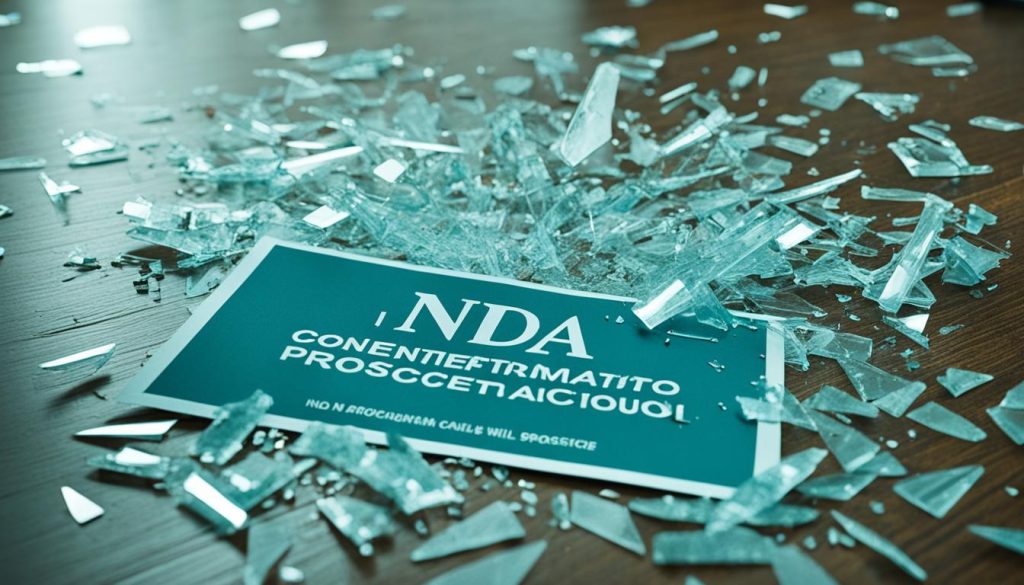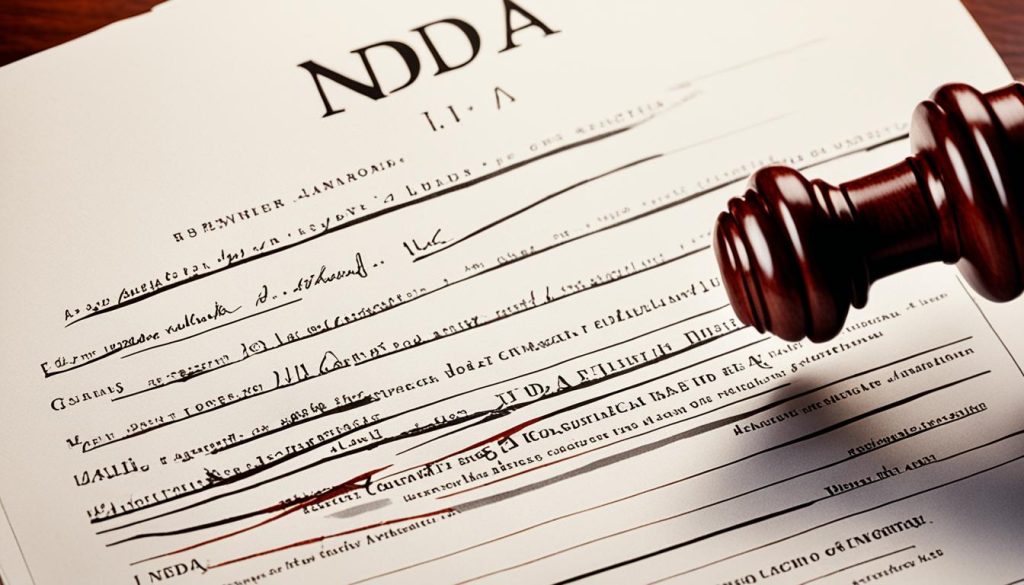Breaking a non-disclosure agreement (NDA) can have serious consequences and legal implications both personally and for the parties involved. An NDA is a legally binding contract that outlines the terms and obligations related to the protection of confidential information. When individuals fail to abide by these obligations, they risk facing severe penalties and legal actions.
In this article, we will explore the potential consequences of breaching an NDA, the legal actions that can be taken, any exceptions to non-disclosure requirements, and the remedies that can be sought in case of a breach. It is essential to understand the nature of NDAs and the potential implications before signing or considering breaking such agreements.
Stay tuned for insightful information and valuable insights into the topic of NDAs and their impact on individuals and businesses.
What Happens If You Break an NDA?
When an NDA is breached, it can lead to significant penalties and repercussions. The first course of action is typically a formal investigation conducted by the HR, legal, and security teams to gather evidence of the breach. These parties will evaluate the severity of the violation, the financial impact, the intentionality behind the breach, and the company’s interest in pursuing legal action.
The repercussions for breaking an NDA can be severe and wide-ranging. Individuals who breach their non-disclosure agreements may face legal consequences, including monetary penalties and damages. Companies may also seek injunctions to prevent further disclosure of confidential information.

The severity of the penalties for breaking an NDA can vary depending on the specific circumstances of the case. It is important to note that there may be exceptions to non-disclosure requirements based on governing laws and particular circumstances outlined within the NDA or relevant legislation. It is crucial for both parties to fully understand and abide by the terms of the NDA to avoid breaching the agreement and facing potential repercussions.
| Consequences | Penalties | Repercussions |
|---|---|---|
| Legal action | Monetary penalties | Damage to professional reputation |
| Injunctions to prevent further disclosure | Lawsuits | Loss of business opportunities |
| Financial compensation for losses incurred | Legal fees | Trust and credibility issues |
Legal Actions for NDA Violation
If sufficient evidence supports a breach of the NDA, the affected party may decide to take legal action. This often involves entering court proceedings and seeking legal remedies for the violation. Remedies can include damages, financial compensation for losses incurred due to the breach, and injunctions to prevent further disclosure of confidential information.
When a breach of an NDA occurs, the injured party has the right to pursue legal recourse to protect their confidential information and seek proper restitution. By taking legal action, individuals and companies can enforce the terms of the NDA and hold the breaching party accountable for their actions.
The decision to initiate legal proceedings is not one to be taken lightly, as it involves time, resources, and potential risks. However, if the breach has caused significant harm or financial loss, pursuing legal action may be necessary to protect one’s interests and maintain the integrity of the NDA.
When seeking legal remedies for NDA violations, the affected party typically collaborates with legal professionals who specialize in contract law and intellectual property. These experts will guide them through the legal process, assess the strength of their case, and advise on the best course of action to achieve a favorable outcome.
It’s important to note that the nature and severity of the breach will influence the legal actions taken. In some cases, damages may be sought to compensate for financial losses resulting from the disclosure of confidential information. This could include the reimbursement of lost profits, business opportunities, or the cost of re-establishing competitive advantage.
In addition, injunctions may be pursued to restrain the breaching party from further dissemination of confidential information. This legal remedy is especially crucial in preventing irreparable harm, ensuring that the confidentiality of the information remains intact.
Overall, taking legal action for NDA violation allows the injured party to seek justice, protect their rights, and deter future breaches. By holding the breaching party accountable, companies and individuals can uphold the importance of confidentiality and safeguard their proprietary information.

Exceptions to Non-Disclosure Requirements
While NDAs typically impose strict confidentiality requirements, there are exceptions that may apply. These exceptions vary depending on the governing jurisdiction and the specific terms outlined in the NDA. Some examples include the expiration of the NDA, criminal wrongdoing, and exceptional circumstances outlined in relevant legislation such as the Public Interest Disclosure Act.
It is crucial to consult with a lawyer before deciding to break an NDA, especially if an exception may apply. A lawyer will provide expert advice and guidance regarding the potential consequences and legal implications of breaking the NDA, ensuring that you make an informed decision.
The Expiration of the NDA
In some cases, an NDA may have a designated expiration date. Once the NDA expires, the confidentiality obligations may no longer be enforceable. However, it is essential to review the NDA carefully, as some agreements may contain provisions that extend the obligations even after the expiration.
Exceptions for Criminal Wrongdoing
If the disclosure of confidential information is related to criminal activity, the NDA may no longer apply. It is important to note that this exception typically applies to situations where the information is disclosed to appropriate law enforcement authorities or regulatory bodies.
Exceptional Circumstances Outlined in Legislation
Relevant legislation, such as the Public Interest Disclosure Act in the UK, provides certain protections for individuals who disclose information in the public interest. If the disclosure falls within the scope of this legislation, it may override the obligations established in the NDA. It is essential to seek legal advice to determine if the circumstances of your case align with the provisions outlined in the applicable legislation.
When considering whether to break an NDA based on an exception, it is crucial to assess the potential risks and consequences carefully. Breaking an NDA without proper justification can still result in legal action and other adverse effects. Consultation with a legal professional is necessary to navigate the complex legal landscape and make informed decisions.
Remedies for Breach of an NDA
If an NDA is breached and the affected party successfully pursues legal action, various remedies can be awarded to address the consequences of breaking a confidentiality agreement. These remedies serve to protect the interests of the aggrieved party and deter further breaches. The two primary forms of remedies for NDA breaches are damages and injunctions.
Damages
Damages are the most common remedy sought in cases of NDA breaches. They provide financial compensation to the affected party for any losses incurred as a direct result of the breach. In the context of breaking a confidentiality agreement, damages aim to reimburse the injured party for both tangible and intangible damages. This can include financial losses, harm to reputation, or other negative consequences arising from the breach.
The exact calculation of damages will depend on the specific circumstances of each case. Factors such as the severity of the breach, the extent of the disclosed information, and the financial impact on the injured party will be considered when determining the appropriate amount of compensation.
Injunctions
Injunctions are another significant remedy available to parties affected by an NDA breach. They are court orders that seek to prevent further disclosure of confidential information and impose restrictions on the breaching party’s access to and sharing of the protected information. Injunctions play a crucial role in maintaining the confidentiality and integrity of the information covered by the NDA.
By granting an injunction, a court can enforce specific prohibitions and requirements on the breaching party. These might include ceasing any further dissemination of the confidential information, returning any physical or digital copies of the information, and refraining from using the information for personal or professional gain.
The issuing of an injunction is intended to provide immediate relief and prevent any further harm resulting from the breach. In some cases, a court may also award interim or temporary injunctions before a final decision is reached.
It’s important to note that the specific remedies awarded in an NDA breach case will depend on the jurisdiction, governing laws, the severity of the breach, and the discretion of the courts. The objective of these remedies is to restore the affected party’s rights and protect the confidentiality and integrity of the disclosed information.
In the next section, we will explore exceptions to non-disclosure requirements and situations where breaking an NDA may be justified.

Time Limits and Enforceability of NDAs
When it comes to non-disclosure agreements (NDAs), understanding their enforceability and time limits is crucial. The enforceability of an NDA can vary depending on the jurisdiction, but in most cases, NDAs are considered legally binding if they are properly drafted and executed.
To make an NDA enforceable, it’s important to include consideration, which refers to something received by the party who signs the agreement. This can be anything of value, such as payment or access to confidential information. Consideration is typically required to validate the enforceability of an NDA.
In the case of employment NDAs, continued at-will employment can fulfill the requirement of consideration. This means that as long as the employee remains in the job, the NDA remains binding. However, it’s essential to review the specific terms of the employment contract and NDA to ensure compliance.
Additionally, it’s worth noting that confidentiality restrictions outlined in an NDA have time limits. These time limits generally range up to six years, after which the signatories are no longer bound by the NDA’s obligations. However, it’s crucial to consult with legal professionals familiar with the local laws and regulations to determine the specific time limits applicable to a particular NDA.
Understanding the enforceability and time limits of an NDA is essential for both parties involved. It ensures that confidential information remains protected and helps avoid any potential legal disputes in the future.
Benefits of Clear Time Limits in NDAs
Clear time limits in NDAs provide several benefits for both the disclosing and receiving parties:
- Protection of confidential information: By establishing specific time limits, the disclosing party can ensure that the confidential information remains protected only for the required duration. This prevents the receiving party from leveraging or disclosing the information after the agreed-upon period.
- Flexibility in business relationships: Time limits allow for flexibility in business relationships. As the need for confidentiality may change over time, establishing time limits provides the option to review and renew the NDA or explore alternative arrangements.
- Clarity and certainty: Time limits bring clarity and certainty to the obligations of the parties involved. Both parties are aware of the duration during which they are bound by the NDA, reducing any ambiguity or confusion.

Having a clear understanding of the enforceability and time limits of an NDA is vital before entering into any confidentiality agreement. It ensures legal compliance, protects confidential information, and provides clarity for all parties involved.
Conclusion
Breaking an NDA can have serious consequences and legal repercussions. Penalties for breaching an NDA can include lawsuits, damages, and injunctions. It is crucial to understand the terms and obligations outlined in the NDA before signing, as ignorance of the agreement is not a valid defense. If you are considering breaking an NDA, it is advisable to seek legal advice to fully comprehend the potential consequences.
Exceptions to non-disclosure requirements may exist, depending on the governing jurisdiction and circumstances outlined in the NDA or relevant legislation. However, it is important to approach the matter with caution and consider the potential penalties and legal implications before taking any action that could violate the obligations of an NDA.
While there may be situations where individuals want to know how to get out of an NDA, it is worth noting that once an NDA is signed, it is legally binding. Getting out of an NDA can be complex and may require negotiating with the other party involved or seeking legal intervention. It is highly recommended to consult with a qualified legal professional to explore available options and mitigate any potential breach of NDA consequences.
FAQs
What are the consequences of breaking an NDA?
Breaking an NDA can lead to serious consequences and legal implications, including lawsuits, financial penalties, and injunctions. It can also damage relationships and reputation.
Are there any exceptions to non-disclosure requirements?
Yes, there may be exceptions to non-disclosure requirements based on governing laws and specific terms outlined in the NDA. These exceptions can vary depending on jurisdiction and circumstances outlined in relevant legislation, such as the Public Interest Disclosure Act.
What legal actions can be taken for NDA violation?
The affected party can take legal action against the breaching party. This may involve entering court proceedings and seeking remedies such as damages, financial compensation for losses, and injunctions to prevent further disclosure of confidential information.
How long do NDAs last and are they legally binding?
The enforceability of an NDA varies depending on jurisdiction, but most consider NDAs to be legally binding if properly drafted and executed. NDAs typically have time limits, usually up to six years, after which the signatories are not bound by the agreement.
What happens if you break an NDA in the UK?
Breaking an NDA in the UK can have the same serious consequences as elsewhere, including legal action, lawsuits, damages, injunctions, and damage to relationships and reputation.
How can I get out of an NDA?
Getting out of an NDA can be legally complicated and may require the assistance of a lawyer. It’s crucial to consider the potential consequences and seek legal advice before taking any action that could violate the obligations of an NDA.





